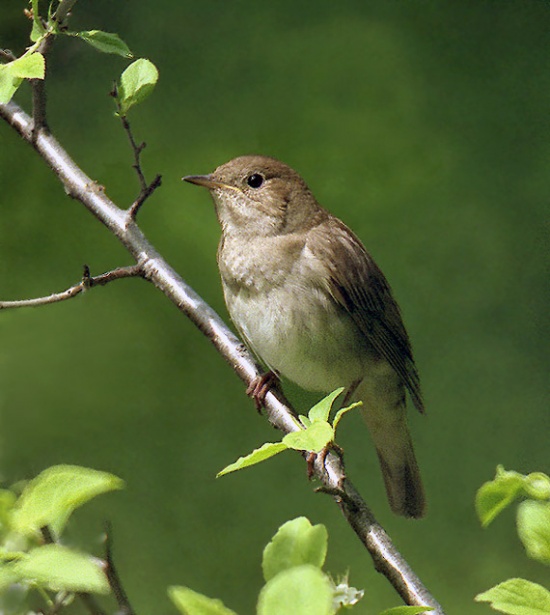(→External Links: GSearch amended for new set up) |
(→External Links: New combined GSearch. GSearch checked template. Video link deleted as no longer available) |
||
| Line 39: | Line 39: | ||
{{ref}} | {{ref}} | ||
==External Links== | ==External Links== | ||
| − | {{GSearch|"luscinia luscinia"}} | + | {{GSearch|"luscinia luscinia" {{!}} "Thrush Nightingale"}} |
| + | {{GS-checked}}1 | ||
| + | <br /> | ||
<br /> | <br /> | ||
| − | |||
| − | [[Category:Birds]] [[Category:Luscinia]][[Category:Bird Songs | + | [[Category:Birds]] [[Category:Luscinia]][[Category:Bird Songs]] |
Revision as of 19:45, 29 April 2023
- Luscinia luscinia
Identification
16–17 cm (6¼-6¾ in)
- Plain greyish-brown upperparts
- Grey to white below
- Brownish breast
Sexes are similar.
Similar Species
Much duller and greyer than Common Nightingale.
Distribution
Breeds in northern Europe and Asia, wintering in eastern and southern Africa.
Europe: Scandinavia, Norway, Sweden, Finland, Denmark, The Netherlands, Switzerland, Germany, Austria, Italy, Estonia, Latvia, Lithuania, Belarus, Poland, Czechoslovakia, Slovakia, Hungary, Slovenia, Yugoslavia, Montenegro, Macedonia, Greece, Crete, Malta, Bulgaria, Romania, Ukraine, Moldova
Northern Africa: Morocco, Egypt
Western Africa: Togo, Democratic Republic of Congo
Eastern Africa: Sudan, Ethiopia, Kenya, Tanzania, Zambia, Mozambique, Malawi
Southern Africa: Namibia, Botswana, Zimbabwe
Middle East: Turkey, Cyprus, Syria, Lebanon, Israel, Jordan, Arabian Peninsula, Saudi Arabia, Yemen, United Arab Emirates, Bahrain, Kuwait, Iraq, Iran, Armenia, Azerbaijan, Georgia
Asia: Russia, Siberia, Kazakhstan, Uzbekistan, Turkmenistan
Taxonomy
This is a monotypic species[1].
Habitat
Wetland forests, scrub and dense, damp thickets (especially alder, hazel and birch)
Behaviour
Breeding
The nest is well hidden, near the ground, in dense thickets.
Diet
The diet includes insects, spiders, some fruit. Forages in leaf litter.
Vocalisation
Song is similar to the Common Nightingale but louder and lacking the crescendo. It's a series of tongue-clicking and gurgling notes.
References
- Clements, J. F., T. S. Schulenberg, M. J. Iliff, D. Roberson, T. A. Fredericks, B. L. Sullivan, and C. L. Wood. 2018. The eBird/Clements checklist of birds of the world: v2018. Downloaded from http://www.birds.cornell.edu/clementschecklist/download/
- Avibase
- BTO BirdFacts
- Collins Field Guide 5th Edition
- Collins Bird Guide ISBN 0 00 219728 6
Recommended Citation
- BirdForum Opus contributors. (2024) Thrush Nightingale. In: BirdForum, the forum for wild birds and birding. Retrieved 4 May 2024 from https://www.birdforum.net/opus/Thrush_Nightingale
External Links
GSearch checked for 2020 platform.1




